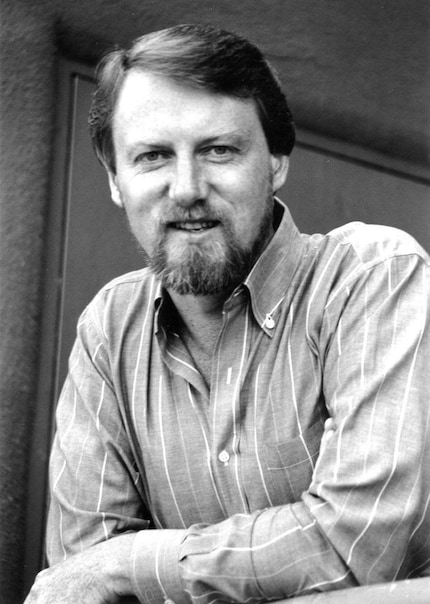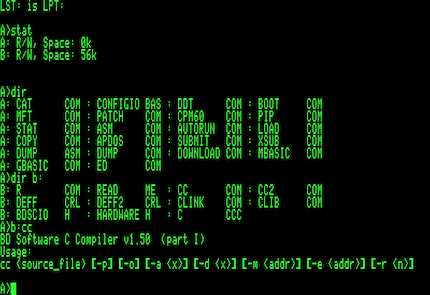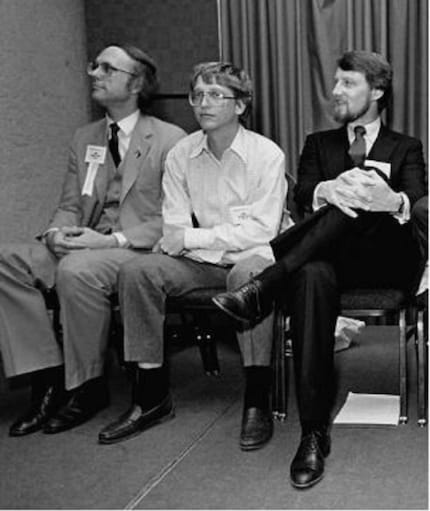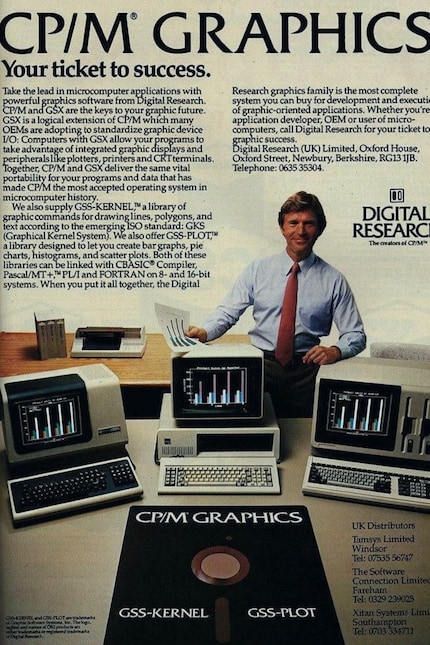
Background information
VisiCalc: The first killer app in computer history
by Kevin Hofer

Gary Kildall was a software pioneer. He developed the CP/M operating system. Although little known, a variant of CP/M was to stimulate the PC industry: DOS.
This article was previously published on 7 April 2020. Due to current events, Kildall's 80th birthday, it is being republished today.
What were the first programmes developed by amateurs for microcomputers? Exactly, video games. The graphics capabilities of microcomputers in the 1970s were very limited. That's why most of them were adventure games or text-based role-playing games. In 1971, Mike Mayfield programmed Star Trek, a text-based game that was ported to the microcomputer. You can still play this game today. To find out how, click here.
Games not only demonstrated the power of microcomputers, they also convinced people who weren't hobbyists or entrepreneurs that they could use a computer. A software market was created. For it to work, it needed an operating system.
Gary Kildall developed the first operating system for microcomputers.

Kildall was born in 1942, the descendant of Norwegian immigrants. In fact, he wants to be a maths teacher in his hometown of Seattle. But he is obsessed with computers. So much so that he obtained a doctorate in computer science.
When Kildall was drafted to Vietnam, he began training as a naval officer. In 1969, the Navy recruited him to teach computer science at the Naval Postgraduate School in Monterey, California. It was there that he came into contact with the first programmable microprocessor, the 4004. Shortly afterwards, he went to work for its manufacturer: Intel.
Kildall was the first to develop the PL/M programming language for microprocessors. In 1973, the CP/M operating system followed. This made it possible to read and write files on an 8-inch floppy disk; the first microcomputer floppy disk operating system was born.

In 1976, Kildall and his wife Dorothy founded the software company Digital Research to develop and market PC software. Kildall rewrote CP/M so that it could be used on different types of computer. To do this, he invented a system called BIOS (Basic Input/Output System). By 1978, the company was earning $100,000 a month and had sales of $44.6 million in 1983. For a time, Kildall's product was the standard operating system on most PCs.

In 1980, at Bill Gates' suggestion, IBM approached Digital Research to negotiate the purchase of a version of CP/M called CP/M-86 for the IBM PC. Gary, as usual, leaves the negotiations to his wife Dorothy. Meanwhile, he is delivering software on his private plane.
Before explaining the purpose of their visit, the IBM representatives insist that Dorothy sign a confidentiality agreement. On the lawyer's advice, she refuses to sign the agreement without Gary's consent. Gary returns in the afternoon to try to move the discussion forward with IBM.
To no avail.
The reasons, why the agreement between Digital Research and IBM failed are, to this day, the subject of speculation: the statements of the people involved do not agree. Everyone tells their own version. Did Gary sign the confidentiality agreement? Did he at least meet IBM representatives?
Digital Research, which has only a few products, may not be willing to sell its core product to IBM for a one-off payment. Typically, the company insists that it has to pay a licence fee.
Digital Research, which has a few products, may not be willing to sell its core product to IBM for a one-off payment.
Dorothy believes that the company will not be able to deliver the CP/M-86 according to IBM's proposed timetable. Digital Research is then in the process of implementing the PL/I programming language for Data General.
Dorothy believes the company will not be able to deliver the CP/M-86 according to IBM's proposed timetable.
It is possible that IBM representatives are also upset that Gary and Dorothy are spending hours on what they see as a routine formality. According to Kildall, he and Dorothy continued to negotiate with IBM on a flight and reached an agreement with a handshake. IBM negotiator Jack Sams, on the other hand, insists that he never met Gary. He does, however, admit that someone else in his group may have negotiated with Kildall.

In any case, negotiator Jack Sams is getting close to Bill Gates again after talks with Kildall, which he considers a failure. He instructs him to find an operating system for the IBM PC. Gates proposed using the 86-DOS operating system. This was an operating system from Seattle Computer Products (SCP) that implemented Kildall's CP/M. IBM would later supply the system under the name IBM PC-DOS. Microsoft licenses the program even later than MS-DOS.
Kildall procures a copy of PC-DOS. After examination, he concludes that PC-DOS infringes his rights to CP/M. He therefore asks the publisher to provide him with a copy of its software. As the legal situation regarding intellectual property in software was unclear, he decided not to press charges. Instead, Kildall threatened IBM with legal action. IBM agreed to offer Kildall's CP/M-86 operating system as an option for the IBM PC. In return, Gary Kildall renounced all legal action. He believes that IBM's personal computers will not be a commercial success.
When the IBM PC was launched, IBM sold PC-DOS separately as an option. It cost just US$40. Although PC-DOS is optional, most software requires the operating system. CP/M-86 was offered as an option a few months later at six times the price. With its $240 price tag, it couldn't compete with PC-DOS and was also supported by less software.
In just a few years, the IBM PC became the undisputed champion. Microsoft the main supplier of operating systems. CP/M gradually disappeared into oblivion. In 1991, Kildall sold his company to Novell Inc. for $120 million. Friends would later recount that he always got enormously upset over the story that he "went stealing" when IBM was visiting. In his eyes, he did everything he could to make the negotiations work.
Later, he becomes increasingly bitter about the missed opportunity with IBM and the fact that Gates has amassed a fortune from DOS. In his manuscript "Computer Connections", he writes of Bill Gates:
I have grown up in the industry with Gates. He is divisive. He is manipulative. He is a user. He has taken much from me and the industry.
According to Gary, Gates is manipulative, divisive and exploitative. He's alleged to have taken a lot from the PC industry and himself. That's a bit strong, considering the two were friends until the IBM deal.
Kildall died on 8 July 1994. The cause of death cannot be definitively determined. Gary Kildall is thought to have fallen on his head a few days earlier and refused treatment. Doctors believe he died as a result of his fall.
He was only 52 years old.
From big data to big brother, Cyborgs to Sci-Fi. All aspects of technology and society fascinate me.
Interesting facts about products, behind-the-scenes looks at manufacturers and deep-dives on interesting people.
Show all